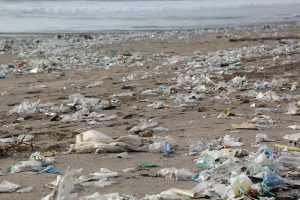There is simply no independent scientific evidence that supports presenting single-use plastic bags as a safeguard against coronavirus. In fact, coronavirus could remain stable on plastic surfaces for longer than on other materials.
.
Hong Kong’s beaches have been strewn with single-use plastic face and surgical masks:
Will plastic pollution get worse after the COVID-19 pandemic? | euronews.com
.
I-News has recently carried a plea by the Executive Director of Greenpeace:
.
Coronavirus is not an excuse for the Government to break promises on banning single-use plastics
Presenting single-use plastic bags as a safeguard against coronavirus is nonsense
 … As people buy more food to cook at home, our household waste, particularly plastic food packaging, builds up. The UK’s top 10 supermarkets are producing more than 900,000 tonnes of plastic packaging annually and despite setting ambitious reduction targets, this amount increases every year. In normal times only 30 to 34 per cent of household plastic waste is collected for recycling but lockdown has meant that some local councils are struggling to maintain recycling services and it’s likely that some of our plastic waste will have to be incinerated or end up in landfill. Our lack of recycling capacity in the UK meant that in 2019, we exported close to 700,000 tons of plastic waste, but now, fewer countries are accepting Britain’s rubbish.
… As people buy more food to cook at home, our household waste, particularly plastic food packaging, builds up. The UK’s top 10 supermarkets are producing more than 900,000 tonnes of plastic packaging annually and despite setting ambitious reduction targets, this amount increases every year. In normal times only 30 to 34 per cent of household plastic waste is collected for recycling but lockdown has meant that some local councils are struggling to maintain recycling services and it’s likely that some of our plastic waste will have to be incinerated or end up in landfill. Our lack of recycling capacity in the UK meant that in 2019, we exported close to 700,000 tons of plastic waste, but now, fewer countries are accepting Britain’s rubbish.
While the coronavirus pandemic is shining a light on our growing plastic waste problem, it is also threatening hard-won progress made to curb production of single-use plastics. In the US, conservative think tanks have used the virus as an opportunity to launch a campaign peddling misinformation about the supposed hygienic properties of single-use plastic…
Indeed, according to the UK government’s most recent health advice, the risk of cross-contamination of coronavirus to food and food packaging is actually very low. Ultimately, hand-washing, good hygiene and food safety processes are the best line of defence….
Coronavirus must not be used as a reason for the Government to drift on its promises around environmental protection. The long awaited ban on plastic straws, stirrers and cotton buds has been delayed by six months. This is intended to allow stretched local councils and businesses time to enact the legislation.
Progress must also remain on track for the introduction of the plastics tax, which will apply to packaging that does not contain at least 30 per cent recycled plastic. This will shift the financial burden from local councils who for too long have used their dwindling coffers to deal with our plastic waste. It’s time for the polluters to pay. Plastics manufacturers must take greater responsibility for cleaning up their own mess.
The coronavirus has brought massive change and upheaval to our lives and the global economy. But disruption can yield some positive outcomes if we get the response right. We now have a unique opportunity to rebuild our economy and structures, placing the health and welfare of people and planet before profit. This must include putting an end to the scourge of pointless plastics that pollute our land, air and sea.
Coronavirus is not an excuse for broken promises on banning single-use plastic | inews.co.uk
.
photo: Disposable 1080P, 2K, 4K, 5K HD wallpapers free download …